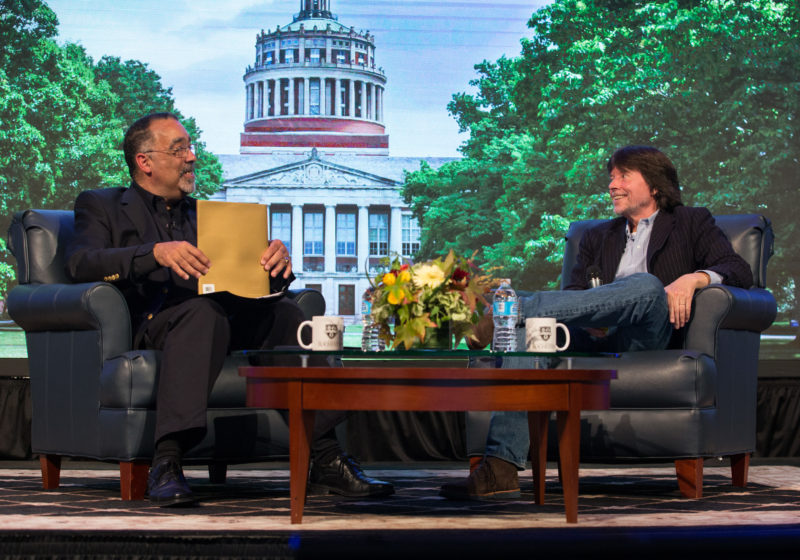Filmmaker Ken Burns sat down with University Dean Paul Burgett last Friday to discuss race in America at the Meliora Weekend Presidential Symposium.
The conversation began with Burgett discussing Burns’ background—specifically, his family’s connection to the University.
“We found your grandfather’s file, Ken” Burgett quipped as he handed Burns a thin folder. “I think we can officially consider you a University of Rochester Yellowjacket by designation.”
Burns’ grandfather, Robert Kyle Burns Jr., served as a member of the University faculty from 1928 until his departure in 1939.
The first part of the discussion focused heavily on slavery.
Burns connected the historic issue to present day America by referencing Germany in the time leading up to World War II.
“If we think that what’s going on now is just a national aberration, we look at the German socialist party, where they started to look at Jim Crowe laws, and then they moved on to [other groups] and we see where that went.”
Various clips from Burns’ productions were shown, including “Civil War” and “Jazz.” The segments showcased racism throughout the nation’s history.
“I’m still trying to process everything,” Kevin Scantlen ‘15 said. “A lot of video segments were very powerful, but I’m a little surprised there wasn’t more discussion on current events.”
Despite the large amount of focus on historic context and events, Burns and Burgett weaved into their dialogue references of more recent events. After a video clip on emancipation from “Civil War,” Burns took a stab at the Republican Party.
“The Republican Party was founded in a small schoolhouse with the goal of liberation,” Burns said, before turning to Richard Nixon’s refusal to campaign in Harlem when he ran against John F. Kennedy. “That’s not the Republican Party of today.”
Burns also went on to express his dissatisfaction with how we have attempted to rid ourselves of our past yet continue to say and do things that are inherently racist. In response to Burns’ mentions of the so-called birther movement and other controversial topics in the news, Burgett said that “the original sin has not been washed away.”
Burns additionally worked to provide a contrast between racial views in America and elsewhere in the world.
“If you take Pat Buchanan and me and go to Ghana or Ireland, we’re both Americans,” Burns said to massive applause. “It doesn’t matter to them.”
He quoted a relative who said, “Oh, it’s some power to give the gift to us to see us how others see us.”
When asked during a Q&A session afterward about the apparent lack of black individuals on campus, Burns declined to specifically comment on the concern. He instead responded by comparing his childhood and events in recent years.
“We nonetheless have an obligation to carry the messages and connections out from this and into our lives and try to apply them in some way,” Burns concluded. “I wore a hooded sweatshirt at 14 and walked into another neighborhood and wasn’t killed. I played with a toy gun as an 11-year-old kid and wasn’t shot by police. Treyvon Martin and Tamir Rice should be at the forefront of this as an example of the issues we face.”
Following the symposium, many people expressed concerns with racial bias in America.
“It’s incredible how 150 years after Lincoln, race is still an issue today,” parents Kathy and Andy King said. “We were just talking about it in the car on the way up.”





